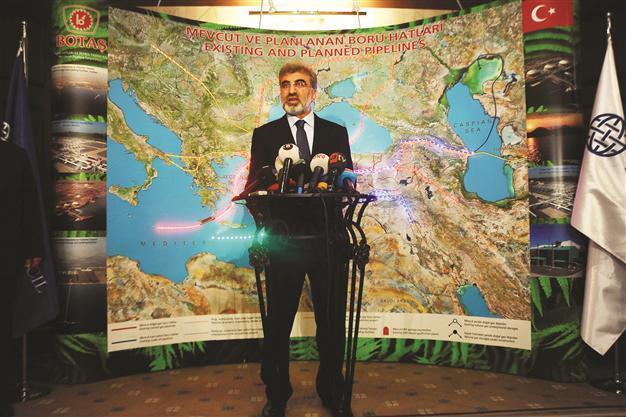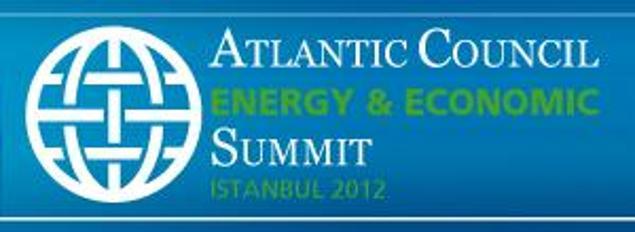Turkey in no place to decide on Azeris' gas

No natural gas price hike is on the agenda this month, Turkish Energy Minister Yıldız says at a session of the Atlantic Council meeting in Istanbul. DHA photo
It is the supplier Shah Deniz II Consortium’s perogative to decide which firm will take Caspian gas to Europe from Turkey, Turkish Energy Minister Taner Yıldız said at the international Atlantic Council meeting in Istanbul, which brought together regional political leaders and energy representatives from all over the world. The minister’s statement comes at a time when the competition to supply Europe with gas heats up over fresh moves from a rival Russian project.“Turkey is not in a position to make a decision on the issue alone so it doesn’t feel the responsibility weighing on its shoulders,” he said. BP and Azerbaijan’s Statoil hold 25.5 percent shares each in the Sash Deniz II as Socar, Total, LukAgip Nioc and Turkey TAO share the rest. Turkey and Azerbaijan are jointly developing the Trans Anatoila Pipeline (TANAP) and eyeing to add more regional resources.
Turkey has seen it can develop an energy project with one of its neighbors without disturbing another, Yıldız said.

Shah Deniz II is on the eve of making a choice between the Nabucco and Trans Adriatic Pipeline (TAP) projects to carry gas from western Turkey to Europe.
Gazprom signs deal
Gazprom, meanwhile, officially started its rival South Stream Project yesterday. The Russian gas giant signed a deal yesterday allowing a major new pipeline to pass through Bulgaria on its way to Western Europe, stealing a march on rival EU-backed projects aimed at reducing the bloc’s energy dependence on Moscow.
“With today’s signing of the final investment decision for the Bulgarian section of South Stream, we move toward the implementation of the project,” Gazprom Chief Alexei Miller said after inking the deal with the head of the state-owned Bulgarian Energy Holding (BEH) Mihail Andonov. “Bulgaria will now become a big transit point of Russian gas to Europe,” Reuters quoted him as saying.
The 3,600-kilometer South Stream pipeline aims from late 2015 onwards to bring huge volumes of Siberian gas to Europe under the Black Sea. The pipeline would then pass over land through Bulgaria, Serbia, Hungary and Slovenia to Italy.
Separately, Turkmenistan, another large player in the natural gas business, plans to begin production at the world’s second-largest gas field next year, a senior official said, opening up new EU- and U.S.-backed supply routes to Europe and Asia at the risk of Russian opposition. Turkmenistan plans to build two pipelines to carry gas from the Galkynysh field. One would run to Pakistan and India and the other would cross the Caspian Sea en route to the European Union.
“We can launch industrial output at Galkynysh next year,” the Turkmen government official, who declined to be named.
Still yesterday, Iran announced it had halted natural gas imports from Turkeminstan. Iran’s Oil Minister Rustem Qasimi said the purchase would be halted until a second notice due to a price dispute, Mehr news agency reported.
Turkey not bad guy: KRG
ISTANBUL - Hürriyet Daily News
Depicting Turkey as a “bad guy” because of its relations with the Kurdistan Regional Government (KRG) in Iraq to develop oil resources in the region is not in the interest of Iraq, the regional natural resources minister said.
“Turkey is not breaking up Iraq, it is the people in Iraq who want to turn us back to dictatorship that are breaking up Iraq,” Ashti Hawrami told the audience at the Atlantic Council’s Energy and Economic Summit that was held in Istanbul yesterday.
Hawrami said the KRG’s good relations with Turkey do not mean that they are undermining their own country.
“Our preferred route for the oil is to have it go through Turkey. For the stability of the region, these 3 million barrels of oil a day should find their way out. And this must be encouraged,” Hawrami said.
With the growing potential of Turkey and the existing oil and gas potential of the KRG, Turkey needs the KRG and the KRG needs Turkey to reach the international market, he said.
Problem of democracy
Hawrami also said Turkey is not the source of the problems in Iraq. “The illness is at home, we as Iraqis are the source of the problems. It is not being caused by Turkey.”
Hawrami said what the KRG has been doing in order to develop the oil resources in Iraq will take Iraq in the right direction. “We will not stop until the Constitution is fully implemented in Iraq.”
The disagreement between the KRG and Baghdad regarding the share of the oil revenue is not about the KRG and Iraqi government anymore, he said. “It is about bad politics and good politics, it is about democracy and power sharing, it is not just us, all Iraqis are concerned about these issues.”
Hawrami also said he was confident about his Turkish counterparts, “because when we talk to our Turkish counterparts, they tell us openly what they think. The trust is there. We are confident we are going to the right direction.”
















